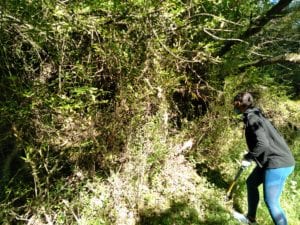WEST LIBERTY, W.Va., Sept. 23, 2020 — Environmental issues have never been more important and West Liberty University students are pleased to do their part to keep the forest healthy.
“Our biology students have been completing service projects at the Schrader Environmental Education Center this semester. Just this week they’ve worked to remove a non-native privet (Ligustrum sinense), a fast spreading invasive-exotic shrub that degrades the quality of the forest by pushing out wildflowers and keeping tree seeds from germinating,” explained Dr. James Wood, an assistant professor of biology at the university.

The Mountain State is known for its streams, mountains and forests and the Schrader Center is located in Oglebay, a 2,000-acre public resort. Privet forms thick masses of leaves and branches that can be over 15 feet tall. The plant is widespread in eastern forests and if privet takes over, it means that there is no forest regeneration when an old tree dies, he noted. With fewer wildflowers and trees, the forest supports fewer species native to West Virginia.
“Deer don’t eat it and insect pests don’t bother it, so it just takes over the forest. By getting rid of it, we can improve wildlife habitat in the park. More flowers mean more birds and butterflies.”
“The Fundamentals of Ecology & Evolution course requires students to perform two service projects and were very enthused about the project,” he said.
Wood earned his undergraduate degree in environmental studies and biology, his master’s in plant biology, and his doctoral degree in ecology, prior to joining WLU in 2017.
The Schrader Center is part of the Wheeling non-profit organization, Oglebay Institute, and is located at Oglebay Park. It has operated for generations offering nature classes, workshops, summer campus and outdoor trails and gardens to give the public a wide variety of nature programming.
“The Schrader Center has many projects they want to take on but there are only so many hours in the day, so we are happy to help them in their mission,” he said.
The biology students will return to the Schrader this coming weekend and finish working on another project preserving a deer skeleton for an upcoming educational exhibit.
“The deer skeleton project began about a month ago and when completed visitors will be able to remove and reassemble the deer skeleton to learn more about the biology and evolution of one the largest mammals in the region.” He said.
The biology department at WLU is housed in the College of Sciences and offers students the choice of a Bachelor of Science Degree in Biology with several different majors, or a Bachelor of Arts Degree in Biology to pursue teaching.
Biology majors include Environmental Stewardship and Education, Ecology, Evolution, and Organismal Biology, Zoo Science and many more. Students also have the opportunity to pursue a Bachelor of Science in Human Biology + Master of Science Physician Assistant Studies degree through our 3+2 program. Many undergraduate students gain valuable experience working with faculty on research projects in award-winning labs.